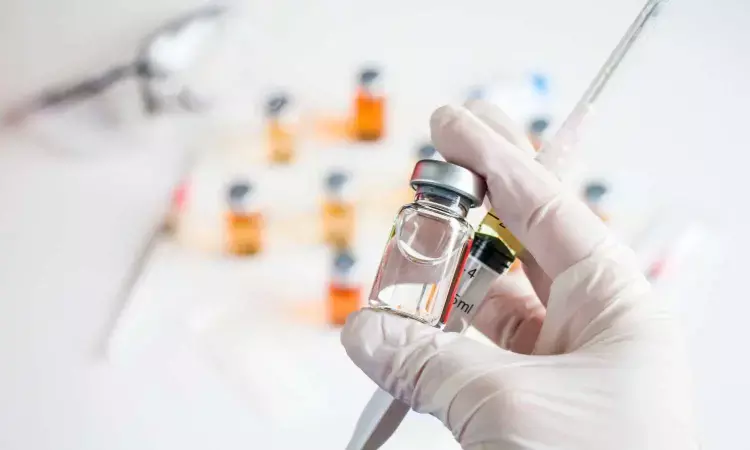- Home
- Medical news & Guidelines
- Anesthesiology
- Cardiology and CTVS
- Critical Care
- Dentistry
- Dermatology
- Diabetes and Endocrinology
- ENT
- Gastroenterology
- Medicine
- Nephrology
- Neurology
- Obstretics-Gynaecology
- Oncology
- Ophthalmology
- Orthopaedics
- Pediatrics-Neonatology
- Psychiatry
- Pulmonology
- Radiology
- Surgery
- Urology
- Laboratory Medicine
- Diet
- Nursing
- Paramedical
- Physiotherapy
- Health news
- Fact Check
- Bone Health Fact Check
- Brain Health Fact Check
- Cancer Related Fact Check
- Child Care Fact Check
- Dental and oral health fact check
- Diabetes and metabolic health fact check
- Diet and Nutrition Fact Check
- Eye and ENT Care Fact Check
- Fitness fact check
- Gut health fact check
- Heart health fact check
- Kidney health fact check
- Medical education fact check
- Men's health fact check
- Respiratory fact check
- Skin and hair care fact check
- Vaccine and Immunization fact check
- Women's health fact check
- AYUSH
- State News
- Andaman and Nicobar Islands
- Andhra Pradesh
- Arunachal Pradesh
- Assam
- Bihar
- Chandigarh
- Chattisgarh
- Dadra and Nagar Haveli
- Daman and Diu
- Delhi
- Goa
- Gujarat
- Haryana
- Himachal Pradesh
- Jammu & Kashmir
- Jharkhand
- Karnataka
- Kerala
- Ladakh
- Lakshadweep
- Madhya Pradesh
- Maharashtra
- Manipur
- Meghalaya
- Mizoram
- Nagaland
- Odisha
- Puducherry
- Punjab
- Rajasthan
- Sikkim
- Tamil Nadu
- Telangana
- Tripura
- Uttar Pradesh
- Uttrakhand
- West Bengal
- Medical Education
- Industry
Group B Meningococcal vaccine reduced gonorrhea incidence among university students: JAMA

USA: A meningococcal group B vaccine (MBV) was shown to offer protection against gonorrhoea, new research published in JAMA Network Open has suggested.
The researchers revealed that OMV (outer membrane vesicles)-based MBV was 47% effective in preventing gonorrhoea among recipients aged 18 to 29 years. The vaccine was even more effective for those aged 18 to 19 years, with a 59% reduction in cases. Interestingly, the number of vaccine doses received did not significantly impact its effectiveness.
In 2017, New Zealand researchers led by Steve G. Robinson reported an intriguing finding: the meningococcal group B vaccine appeared to reduce the incidence of gonorrhoea by 31%. This discovery was particularly significant because, previously, no effective vaccine against gonorrhoea had been found. The vaccine was designed to target outer membrane vesicles (OMVs) common to both Neisseria meningitidis and Neisseria gonorrhoeae, which are genetically closely related.
Following the New Zealand study, several retrospective, population-based studies successfully replicated these findings using chlamydia or other vaccines as controls. Now, two MBVs are available in the US: MenB-4C (OMV-based) and MenB-FHbp (not OMV-based).
To further investigate this, researchers conducted a case-control study among vaccine recipients aged 18 to 29 years who were reported to Oregon's ALERT Immunization Information System by on-campus or community-based practitioners near two affected universities in Oregon. Gonorrhoea cases were determined by linking immunisation data to disease reports from 1 month to 2 years after vaccination or study end.
While these results are promising, the study had some limitations, including the low number of gonorrhoea cases, the likelihood of students leaving the disease-reporting area upon graduation, and the inability to assess baseline gonorrhoea rates at the universities.
Given the significant global burden of gonorrhoea, further research into OMV-based vaccination technology may be warranted. This unexpected benefit of the meningococcal vaccine could potentially contribute to the reduction of gonorrhoea cases, improving public health outcomes.
Reference:
Robison, S. G., & Leman, R. F. (2023). Association of group B meningococcal vaccine receipt with reduced gonorrhoea incidence among university students. JAMA Network Open, 6(8), e2331742. https://doi.org/10.1001/jamanetworkopen.2023.31742
Dr Kamal Kant Kohli-MBBS, DTCD- a chest specialist with more than 30 years of practice and a flair for writing clinical articles, Dr Kamal Kant Kohli joined Medical Dialogues as a Chief Editor of Medical News. Besides writing articles, as an editor, he proofreads and verifies all the medical content published on Medical Dialogues including those coming from journals, studies,medical conferences,guidelines etc. Email: drkohli@medicaldialogues.in. Contact no. 011-43720751


